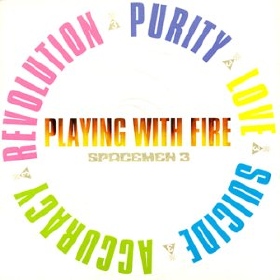 Quality: 4 out of 5
Quality: 4 out of 5Trip-O-Meter: 4 out of 5
Now this is a horrific album cover. Apparently, the execs at Virgin Records decided that they wanted to market Hillage as some sort of new age Jesus figure, and I feel that this cover really reflects this. Fortunately, it does not effect the music inside, and if you get past the poor visual design, you'll find another solid Hillage album.
Once again, there are some changes here. Hillage had finally hooked up with a stable band (and still skilled) at this point, and Miquette Giraudy is now working her synth magic as a full member. To get an awesome dose of what she does, head straight for "Searching For The Spark." The songs here are also much more concise, giving Motivation Radio much more of a pop edge. It's a really happy, positive sounding album.
Hillage always came up with killer guitar riffs, and they work quite well in a more traditional song context. "Motivation" and "Saucer Surfing" in particular have some classic riffs. I like to refer to this stuff as sounding like the happy version of 70s era Pink Floyd. Feeling comfortable as a solo artist, Hillage references Gong a little more, especially in the goofy call and response of "Light In The Sky" and the Radio Gnome informed "Octave Doctors." He scores another great cover song too with the closing version of Buddy Holly's "Not Fade Away," which retains the Bo Diddley beat but injects the song with a cosmic vibe.
As a warning, there is a certain amount of cheese present here. Hillage's lyrics are often hopelessly new age naive, but he sounds so happy singing them that I can't help but forgive him. He projects a lot of joy in his music that glosses over some potential rough spots. There's also even more 70's white boy funk present here, but the band is more than limber and I think they make it through ok.
Motivation Radio may be the best introduction to Hillage. It retains most of his trademark sound, but serves it up in a more pop sort of context. As a result, Hillage's best compositions are present here.
Buy Me:
Steve Hillage - 1977 - Motivation Radio












